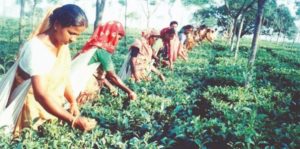Plucking tea leaves brings self-reliance to 10,000 women
Source: Dhaka Tribune
They expressed happiness as plucking tea leaves improved their economic conditions
Plucking of tea-leaves brings self-reliance to some 10,000 female farm-laborers in the fast expanding tea sector on the “Kartoa Valley” ecological zone in the northern region of Rangpur
Along with bringing well being to their families by earning through plucking green tea leaves, the women have won poverty improving their standard of living life and their well-dressed children are now going to schools.
Female tea-garden labourers, including housewives, widows, divorcees and unemployed young girls said they are effectively contributing to their families for living with dignity and honor.
“We are drinking safe water, using sanitary latrines, adopting family planning, stopping child marriage, taking healthcare and living better with our earnings,” tea-garden worker Lovely Begum of village Danagoachh in Tentulia upazila of Panchagarh said.
Laborers Aklima Khatun of Moynaguri; Phuli Begum of Kandaligoach; Mariyam of Guchchagram; Rozina of Narayangoach and Halima of Dodhigoach villages in Tentulia upazila said they are plucking tea-leaves for last 12 years.
Labourers Shyamoli, Joytsna Begum and Mukta Rani of these villages said they are earning daily wages between Tk. 250-Tk. 300 on an average by plucking tea leaves in the tea gardens.
“Earlier, I passed my days desolately. Now, I earn up to Tk. 300 as wages per day to lead better life with my children,” said widow Sokhina of Danagoachh village
Similarly, female laborers Laboni Yasmin, Morsheda, Azmeri Begum and Kohinoor of Panchagarh Sadar upazila said they are plucking tea leaves to live better life though they faced hard days even a decade ago.
The female tea-garden laborers expressed their common happiness of sending their children to schools as plucking of tea-leaves has created job opportunity for them to earn wages for improving their economic conditions.
No concrete rules regarding labor law established yet
The laborers said, almost no concrete rules regarding labor law, working period, appointment letters, minimum wage, medicare facilities, maintaining register books, safety and security measures for the female labors have been implemented yet.
“We are hopeful the authorities concerned will resolve these problems for our better future as the tea sector is growing fast on the valley,” Azmeri added.
Vice-President of Panchagarh Chamber of Commerce and Industry Mehedi Hasan Khan Babla said the boosting tea sector on the “Kartoa Valley” is enhancing economy along with creating huge employments for unemployed women.
“By plucking green tea leaves, around 10,000 poor women have already won poverty and are leading improved lives with a dream of building better future for their children following their well-being and empowerment,” Babla said.
PM founded ‘small-scale gardening-basis’ tea cultivation in 2000
Senior Scientific Officer of Bangladesh Tea Board at Panchagarh regional office Dr Mohammad Shameem Al Mamun said Prime Minister Sheikh Hasina first launched “small-scale gardening-basis” tea cultivation in plain land of Panchagarh in 2000.
Since then, tea cultivation continues increasing and its commercial basis farming began in 2005 as the farmers found “small-scale gardening-basis” tea cultivation on plain lands highly profitable in the area.
“An all-time record 8.46 m kg of ‘made-tea’ worth about Tk. 206 crore was produced in the Kartoa Valley in 2018 which is higher by 57% than the output of 5.4 m kg ‘made tea’ in 2017,” Dr Shameem added.
Last year, tea was cultivated on 7,645 acres of lands in the valley comprising of five northern districts as tea cultivation is expanding every year following implementation of various pragmatic steps by the present government.
“The number of tea-garden laborers, especially tea-leaves plucking female laborers are increasing every year with faster expansion of the highly proactive tea sector on the Kartoa Valley,” he added.









